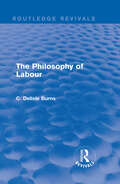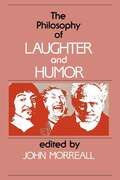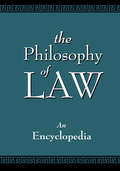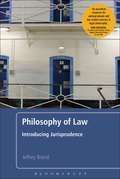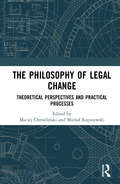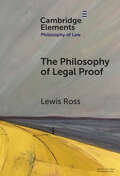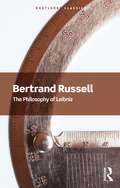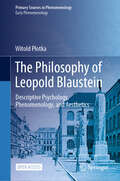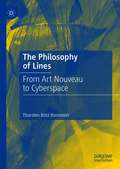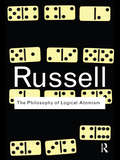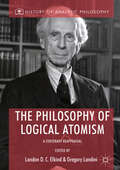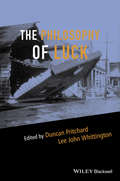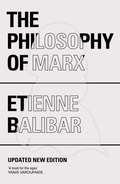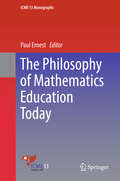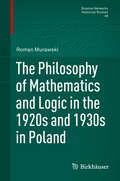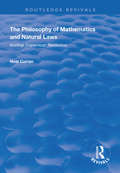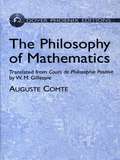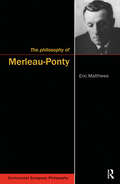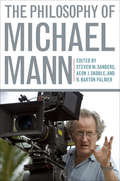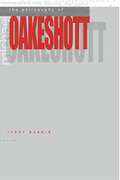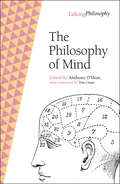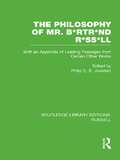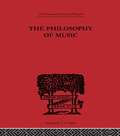- Table View
- List View
The Philosophy of Labour (Routledge Revivals)
by C. Delisle BurnsOriginally published in 1925, C. Delisle Burns’ The Philosophy of Labour attempts to lay down key aspects of labour and the working class of that time period, covering aspects such as economic obstacles, standards of living and patriotism. Burns does not draw on past philosophers or sociological thinkers of the working-class and instead chose to focus only on the attitude of the workers in factories, mines, roads, railways and other forms of manual labour. This title will be of interest to students of philosophy.
The Philosophy of Laughter and Humor (Suny Series in Philosophy)
by John MorreallJohn Morreall is Associate Professor of Philosophy at Rochester Institute of Technology. He has written widely in philosophy, religion, and linguistics, and is the author of Taking Laughter Seriously, published by SUNY Press, and Analogy and Talking about God.
The Philosophy of Law: An Encyclopedia (Garland Reference Library Of The Humanities Ser.)
by Christopher Berry GreyFrom articles centering on the detailed and doctrinal exposition of the law to those which reside almost wholly within the realm of philosophical ethics, this volume affords comprehensive treatment to both sides of the philosophico-legal equation. Systematic and sustained coverage of the many dimensions of legal thought gives ample expression to the true breadth and depth of the philosophy of law, with coverage of:The modes of knowing and the kinds of normativity used in the law; Studies in international, constitutional, criminal, administrative, persons and property, contracts and tort law-including their historical origins and worldwide ramifications; Current legal cultures such as common law and civilian, European, and Aboriginal; Influential jurisprudents and their biographies; All influential schools and methods
The Philosophy of Law: Introduction to Jurisprudence
by Jeffrey BrandOrganized around specific questions, theses and arguments, Philosophy of Law: Introducing Jurisprudence helps students get to grips with the fascinating yet often complex realm of legal philosophy. Packed with boxed case studies, chapter discussion questions, guides to further reading, a glossary of key terms and online resources for lecturers and students, Jeffrey Brand guides the reader through ideas in an accessible way. Philosophy of Law is ideal for use as a core textbook or as a companion to a set of primary sources.
The Philosophy of Legal Change: Theoretical Perspectives and Practical Processes
Democratic legal systems have recently been subject to rapid and multi-directional processes of change. There are numerous sociological, technological, ideological, or purely political processes which result in law’s amendment and transformation. This book argues that this legal change is best understood from a political philosophy perspective. This can be used as an interpretative device to understand the ongoing processes of change as well as their outcomes such as new laws, judicial interpretations, or constitutional amendments. The work has three main objectives: to provide deeper understanding of the problems of legal change within the diversity of Western political and legal thought; to examine the development of the processes of change in terms of their normative and prudential acceptability; to interpret actual processes of change with a view to the general theoretical and normative background. The book is divided into three parts: Part I sets the scene and is focused on the general issues important for understanding and evaluating legal change from the perspective of political philosophy; Part II focuses on the spectrum of politico-philosophical justifications present in the political culture of democratic states; Part III offers selected case studies to specify and apply the philosophical ideas in the previous parts. The book will be a valuable resource for students and scholars of law and jurisprudence, including comparative legal studies and human rights law, political theory, and philosophy.
The Philosophy of Legal Proof (Elements in Philosophy of Law)
by Lewis RossCriminal courts make decisions that can remove the liberty and even life of those accused. Civil trials can cause the bankruptcy of companies employing thousands of people, asylum seekers being deported, or children being placed into state care. Selecting the right standards when deciding legal cases is of utmost importance in giving those affected a fair deal. This Element is an introduction to the philosophy of legal proof. It is organised around five questions. First, it introduces the standards of proof and considers what justifies them. Second, it discusses whether we should use different standards in different cases. Third, it asks whether trials should end only in binary outcomes or use more fine-grained or precise verdicts. Fourth, it considers whether proof is simply about probability, concentrating on the famous 'Proof Paradox'. Finally, it examines who should be trusted with deciding trials, focusing on the jury system.
The Philosophy of Leibniz (Routledge Classics)
by Bertrand RussellBertrand Russell’s study of the philosopher and mathematician Gottfried Leibniz is one of his earliest books, providing a fascinating glimpse of his philosophical brilliance. It remains one of the most important books on this polymathic seventeenth-century thinker and the only book Russell wrote about a major philosopher.Written when Russell was only in his late twenties, it goes far beyond a mere exposition of Leibniz's thought. Celebrated for his invention of the differential calculus and a major figure in the development of rationalist philosophy, Leibniz is hailed by many as the last universal genius. Russell argues that the tension between Leibniz's theological writings for the Hanoverian royalty on the one hand and his philosophical work on the other obscures, in Russell's opinion, Leibniz's greatest gift to philosophy: the view that logic is the start of all philosophy.Exploring Leibniz's contributions to epistemology, substance, space and time, the soul and body, and the existence of God, Russell pushes philosophy and logical thought in bold new directions. It remains a vital work in Russell's oeuvre and a landmark study of a major philosopher.This Routledge Classics Edition has a new Foreword by Richard T. W. Arthur.
The Philosophy of Leopold Blaustein: Descriptive Psychology, Phenomenology, and Aesthetics (Primary Sources in Phenomenology)
by Witold PłotkaThis is an open-access book which is devoted to rediscovering the early history of phenomenology in confrontation with the legacy of Franz Brentano by discussing Leopold Blaustein’s philosophy. It offers a unique perspective on the history of the phenomenological movement by presenting the development of Blaustein’s theory. Blaustein was a philosopher educated by Kazimierz Twardowski in Lvov, but he also held research stays in Freiburg im Breisgau (where he studied under Edmund Husserl) and in Berlin (where he met Carl Stumpf). Blaustein’s work is usually classified as phenomenology yet some scholars question this by claiming that Blaustein was radically critical of Husserl’s phenomenology. This text addresses these divergent opinions by claiming that Blaustein was both a descriptive psychologist and a phenomenologist. Moreover, the book shows that these two motives were intertwined in Blaustein’s writings and require a reference to other traditions such as the Gestalt theory of Stumpf, and the humanistic psychology of Dilthey. This volume examines sources, context, and applications of the methods used by Blaustein in his original philosophy. It appeals to philosophers, especially phenomenologists, epistemologies, and historians. The more specialized chapters are also relevant to historians of the phenomenological movement and the Brentanian tradition.
The Philosophy of Lines: From Art Nouveau to Cyberspace
by Thorsten Botz-BornsteinThis book offers a philosophical exploration of lines in art and culture, and traces their history from Antiquity onwards. Lines can be physical phenomena, cognitive responses to observed processes, or both at the same time. Based on this assumption, the book describes the “philosophy of lines” in art, architecture, and science. The book compares Western and Eastern traditions. It examines lines in the works of Paul Klee, Wassily Kandinsky, and Henri Michaux, as well as in Chinese and Japanese art and calligraphy. Lines are not merely a matter of aesthetics but also reflect the psychological states of entire cultures. In the nineteenth century, non-Euclidean geometry sparked the phenomenon of the “self-negating line,” which influenced modern art; it also prepared the ground for virtual reality. Straight lines, distorted lines, blurred lines, hot and cold lines, dynamic lines, lines of force, virtual lines, and on and on, lines narrate the development of human civilization.
The Philosophy of Logical Atomism (Routledge Classics #8)
by Bertrand RussellLogical Atomism is a philosophy that sought to account for the world in all its various aspects by relating it to the structure of the language in which we articulate information. In The Philosophy of Logical Atomism, Bertrand Russell, with input from his young student Ludwig Wittgenstein, developed the concept and argues for a reformed language based on pure logic. Despite Russell’s own future doubts surrounding the concept, this founding and definitive work in analytical philosophy by one of the world’s most significant philosophers is a remarkable attempt to establish a novel way of thinking.
The Philosophy of Logical Atomism: A Centenary Reappraisal (History of Analytic Philosophy)
by Gregory Landini Landon D. ElkindThis book offers a comprehensive critical survey of issues of historical interpretation and evaluation in Bertrand Russell's 1918 logical atomism lectures and logical atomism itself. These lectures record the culmination of Russell's thought in response to discussions with Wittgenstein on the nature of judgement and philosophy of logic and with Moore and other philosophical realists about epistemology and ontological atomism, and to Whitehead and Russell’s novel extension of revolutionary nineteenth-century work in mathematics and logic. Russell's logical atomism lectures have had a lasting impact on analytic philosophy and on Russell's contemporaries including Carnap, Ramsey, Stebbing, and Wittgenstein. Comprised of 14 original essays, this book will demonstrate how the direct and indirect influence of these lectures thus runs deep and wide.
The Philosophy of Luck (Metaphilosophy)
by Duncan Pritchard Lee John WhittingtonThis is the first volume of its kind to provide a curated collection of cutting-edge scholarship on the philosophy of luck Offers an in-depth examination of the concept of luck, which has often been overlooked in philosophical study Includes discussions of luck from a range of philosophical perspectives, including ethics, epistemology, metaphysics, and cognitive science Examines the role of luck in core philosophical problems, such as free will Features work from the main philosophers writing on luck today
The Philosophy of Marx
by Gregory Elliott Chris Turner Étienne BalibarA rich and accessible introduction to Marx’s fundamental concepts from a key intellectual—now updatedWritten by one of political theory’s leading thinkers, The Philosophy of Marx examines all the key areas of Marx’s writings in their wider historical and theoretical context—including the concepts of class struggle, ideology, humanism, progress, determinism, commodity fetishism, and the state. Etienne Balibar opens a gateway into the thought of one of history’s great minds. In this updated edition to this now classic work, Balibar has added a substantial introduction and new material. Complete with key “information boxes” for the student to make the most challenging areas of theory easy to understand, this remains the best available introduction to the most important thinker of the past 200 years.
The Philosophy of Mathematics Education Today (ICME-13 Monographs)
by Paul ErnestThis book offers an up-to-date overview of the research on philosophy of mathematics education, one of the most important and relevant areas of theory. The contributions analyse, question, challenge, and critique the claims of mathematics education practice, policy, theory and research, offering ways forward for new and better solutions. The book poses basic questions, including: What are our aims of teaching and learning mathematics? What is mathematics anyway? How is mathematics related to society in the 21st century? How do students learn mathematics? What have we learnt about mathematics teaching? Applied philosophy can help to answer these and other fundamental questions, and only through an in-depth analysis can the practice of the teaching and learning of mathematics be improved. The book addresses important themes, such as critical mathematics education, the traditional role of mathematics in schools during the current unprecedented political, social, and environmental crises, and the way in which the teaching and learning of mathematics can better serve social justice and make the world a better place for the future.
The Philosophy of Mathematics and Logic in the 1920s and 1930s in Poland
by Roman MurawskiThe aim of this book is to present and analyze philosophical conceptions concerning mathematics and logic as formulated by Polish logicians, mathematicians and philosophers in the 1920s and 1930s. It was a remarkable period in the history of Polish science, in particular in the history of Polish logic and mathematics. Therefore, it is justified to ask whether and to what extent the development of logic and mathematics was accompanied by a philosophical reflection. We try to answer those questions by analyzing both works of Polish logicians and mathematicians who have a philosophical temperament as well as their research practice. Works and philosophical views of the following Polish scientists will be analyzed: WacÅ,aw SierpiÅ,,ski, Zygmunt Janiszewski, Stefan Mazurkiewicz, Stefan Banach Hugo Steinhaus, Eustachy Å»yliÅ,,sk and Leon Chwistek, Jan Å ukasiewicz, Zygmunt Zawirski, StanisÅ,aw LeÅ>niewski, Tadeusz KotarbiÅ,,ski, Kazimierz Ajdukiewicz, Alfred Tarski, Andrzej Mostowski and Henryk Mehlberg, Jan SleszyÅ,,ski, StanisÅ,aw Zaremba and Witold Wilkosz. To indicate the background of scientists being active in the 1920s and 1930s we consider in Chapter 1 some predecessors, in particular: Jan Åsniadecki, Józef Maria Hoene-WroÅ,,ski, Samuel Dickstein and Edward Stamm.
The Philosophy of Mathematics and Natural Laws: Another Copernican Revolution (Routledge Revivals)
by Noel CurranFirst published in 1997, this title is a sequel to Dr Noel Curran's first book The Logical Universe: The Real Universe (published by Ashgate under the Avebury imprint, 1994). The philosophy of mathematics in this book is based on ideas of Sir William Rowan Hamilton on the ordinal character of numbers, the real numbers, the measure numbers, scalar numbers and the extension to vectors. The final extension is to Hamilton’s quaternions. This algebra is interpreted as the mathematics of spin. This led to a a new theory of time and space which is Euclidian. The motion of spin is absolute, no frame of reference is required. If time is assumed to have a beginning it would be asymmetric with an arrow. This concept is applied to the laws of nature, which are symmetrical. This is another Copernican Revolution in three aspects: absolute time is restored, time has an arrow - is asymmetric, and thirdly the theory is based on the motion of spin which is absolute and more fundamental than the motion of translation. This opens the way to the final unification of physics.
The Philosophy of Mathematics: Translated from Cours de Philosophie Positive by W. M. Gillespie
by Auguste ComteWritten by the nineteenth-century French philosophical founder of positivism, this comprehensive map of mathematical science assigns to each part of the complex whole its true position and value. The two-part treatment begins with a general view of mathematical analysis and advances to algebra, continuing with an exploration of geometry's ancient and modern methods.
The Philosophy of Merleau-Ponty (Continental European Philosophy Ser. #2)
by Eric MatthewsIn this introduction to the life and thought of one of the most important French thinkers of the twentieth-century Eric Matthews shows how Merleau-Ponty has contributed to current debates in philosophy, such as the nature of consciousness, the relation between biology and personality, the historical understanding of human thought and society, and many others. Surveying the whole range of Merleau-Ponty's thinking, the author examines his views about the nature of phenomenology and the primacy of perception; his account of human embodiment, being-in-the-world, and his understanding of human behaviour; his conception of the self and its relation to other selves; and, his views on society, politics, and the arts. A final chapter considers his later thought, published posthumously. The ideas of Merleau-Ponty are shown to be of immense importance to the development of French philosophy and the author evaluates his distinctive contributions and relates his thought to that of his predecessors, contemporaries and successors, both in France and elsewhere. This unrivalled introduction will be welcomed by philosophers and cognitive scientists as well as students taking courses in contemporary continental philosophy.
The Philosophy of Michael Mann (The Philosophy of Popular Culture)
by Aeon J. Skoble R. Barton Palmer Steven SandersA collection of essays exploring the philosophical themes and aesthetic vision behind blockbuster film including The Insider, Public Enemies,and more.Known for his finely crafted crime thrillers, American filmmaker Michael Mann has long been regarded as a talented triple threat capable of moving effortlessly between television and feature films as a writer, director, and executive producer. His unique visual sense and thematic approach are evident in the Emmy Award-winning The Jericho Mile, the cult favorite The Keep, the American epic The Last of the Mohicans, and the Academy Award-nominated The Insider, as well as more recent works such as Ali, Miami Vice, and Public Enemies.The Philosophy of Michael Mann provides a comprehensive account of the work of this highly accomplished filmmaker, exploring the director's recognizable visual style and the various on-screen and philosophical elements he has tested in his thirty-five-year career. The essays in this wide-ranging book will appeal to fans of the revolutionary filmmaker and to philosophical scholars interested in the themes and conflicts that drive his movies.
The Philosophy of Michael Oakeshott (G - Reference, Information and Interdisciplinary Subjects)
by Terry NardinThis is the first comprehensive study of Michael Oakeshott as a philosopher rather than a political theorist, which is how most commentators have regarded him. Indeed, the careful reading of his published and unpublished writings that Terry Nardin provides here shows that Oakeshott's concerns have been primarily philosophical, not political. These writings go far beyond politics to offer a critical philosophy of human activity and of the disciplines that interpret and explain it. Oakeshott argues that inquiry can be independent of practical concerns, even when its subject is the thought and action of human beings.Although the book considers Oakeshott's views on morality, law, and government, it is primarily concerned with his ideas about the character of knowledge, especially knowledge of intelligent human conduct, and focuses attention on the concepts of modality, contingency, and civility that are central to Oakeshott's philosophy as a whole. Nardin seeks to show how Oakeshott's critique of scientism and other forms of foundationalism supports a powerful version of the argument that history is the proper mode for understanding human choice and action.The book thus provides the fullest discussion available of Oakeshott's antifoundationalist view of epistemology, metaphysics, and the philosophy of history and the human sciences. It examines his arguments concerning the criteria of truth, the forms of knowledge, the relationship between theory and practice, the place of interpretation in the social sciences, the nature and importance of historical explanation, and the definition of philosophy itself. And it is the first study to look at Oakeshott's relationship to phenomenology, hermeneutics, and other movements in twentieth-century Continental philosophy.
The Philosophy of Mind (Talking Philosophy)
by Tim Crane Anthony O’HearA deep concern with consciousness and intentionality is one of the several things that has lately moved into the centre of the philosophy of mind. The issue of consciousness is often treated as something distinct from intentionality, but – as Tim Crane notes in his incisive new Foreword – there is now something of a sea-change. This classic volume may be at least partly responsible for the shift in how philosophy of mind is starting to be understood. Before its first appearance, discussions of consciousness and intentionality in the context of perception were in their infancy. The book was a departure from the way this part of philosophy was conceived. It pointed to new ways to look at the discipline, addressing both the epistemology of mind, and intentionality and consciousness, especially in connection with perception. Showcasing many leading figures in the field, it offers a splendid overview of the issues at stake.
The Philosophy of Movement: An Introduction
by Thomas NailAn influential thinker distills years of work on the philosophy of movement into one accessible account Why are city dwellers worldwide walking on average ten percent faster than they were a decade ago? Why are newcomer immigrant groups so often maligned when migration has always constituted civilization? To analyze and understand the depth of the reasons, Thomas Nail suggests that it serves us well to turn to a philosophy of movement. Synthesizing and extending many years of his influential work, The Philosophy of Movement is a comprehensive argument for how motion is the primary force in human and natural history. Nail critiques the bias toward stasis at the core of Western thought, asking: what would a philosophy that began with the primacy of movement look like? Interrogating the consequences of movement throughout history and in daily life in the twenty-first century, he draws connections and traces patterns between scales of reality, periods of history, and fields of knowledge. In our age of rapid movements shaped by accelerating climate change and ensuing mass global migration, as well as ubiquitous digital media, Nail provides a contemporary philosophy that helps us understand how we got here and how to grapple with these interlocking challenges. With a foreword by philosopher Daniel W. Smith, The Philosophy of Movement: An Introduction is a must-read for scholars and students not only of philosophy but also history, anthropology, science and technology studies, mobility studies, and other fields across the humanities and social sciences.
The Philosophy of Mr. B*rtr*nd R*ss*ll: With an Appendix of Leading Passages from Certain Other Works. A Skit. (Routledge Library Editions: Russell)
by Philip E. B. JourdainThis skit of Bertrand Russell’s philosophy was originally published in 1918 by Russell’s correspondent friend Jourdain. The introduction explains that the contents purport to be lost papers written by Mr. B*rtr*nd R*ss*ll, a contemporary of Bertrand Russell. This politically humorous volume from the early 20th Century parodies the writing style of Russell as well as his theories.
The Philosophy of Music: Being The Substance Of A Course Of Lectures (classic Reprint) (International Library of Philosophy)
by William PoleFirst published in 2000. Routledge is an imprint of Taylor & Francis, an informa company.
